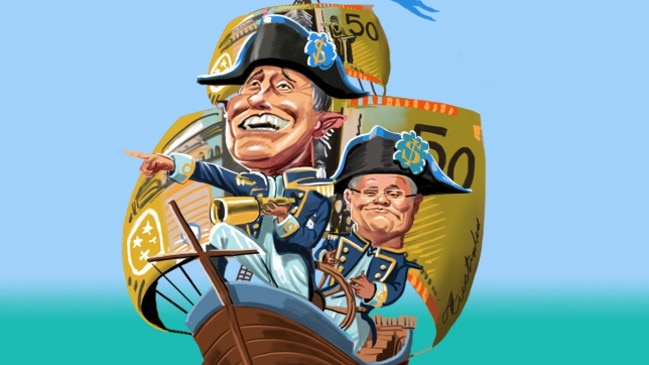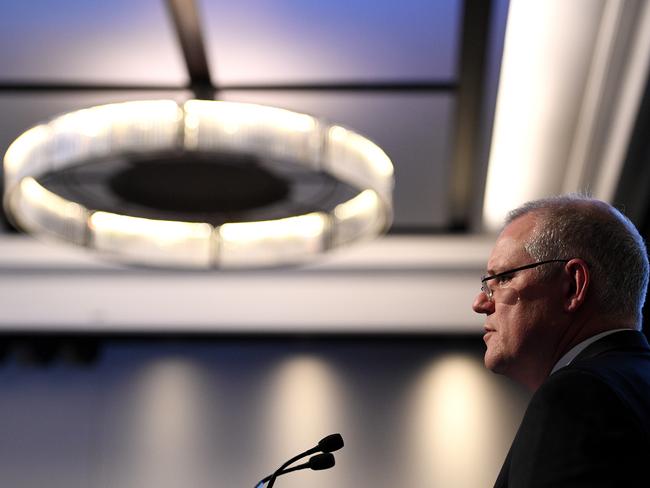Sharri Markson: Pressure on Government to avoid tough decisions that could cost votes
ON the good ship Turnbull, sights are set on voter approval no matter the fiscal wisdom of dropping the Medicare levy hike and cutting tax in the Federal Budget.

Opinion
Don't miss out on the headlines from Opinion. Followed categories will be added to My News.
SCOTT Morrison’s decision to scrap the $600 a year Medicare levy hike is an illuminating barometer of how the Turnbull government is positioning itself one year out from the federal election.
Malcolm Turnbull is not prepared to sign off on policies that will cause financial pain to families.
On one level, this is entirely welcome. Australians are among the highest-taxed citizens of any country in the world.
We pay more personal income tax as a share of all tax revenue than any other OECD country except for Denmark.

Some 41.5 per cent of the government’s total tax revenue is comprised of personal income tax, compared with just 27 per cent in the UK and an OECD average of 24 per cent.
It’s even more fascinating when you look at precisely who is paying all this income tax. It won’t surprise many readers to learn the bottom 50 per cent of taxpayers contribute just 12 per cent of the government personal income tax take.
Meanwhile the two and a half million Aussies earning more than $87,000 a year carry the burden of paying 65 per cent of all personal income tax.
Instead of sensible spending cuts to fund new programs, political instinct over the past 11 years has leant towards finding ways to make us pay even more tax. It’s time this stopped.
On another level, however, the Turnbull government’s decision to scrap the Medicare levy surcharge shows that a year out from an election, the pressure is on to avoid tough or contentious decisions that could cost votes.

The Medicare levy surcharge had not passed the Senate, and leaving it on the books may have been problematic with the ratings agencies. It may have caused them to lose faith in the credibility of the Budget.
But the levy hike of 0.5 per cent was not causing the government too much political heat.
The idea to raise the levy to pay for the National Disability Insurance Scheme was Julia Gillard’s in the first place and Labor agreed with raising the levy for families earning more than $87,000.
Morrison was reduced to tears in a moving speech when he spoke about the need to increase the Medicare levy to pay for the NDIS.
Who could object to paying more to help people in need?
The levy would have brought in $8.2 billion over the forward estimates and it was not damaging them politically. Yet the government hit reverse in any case.

The Expenditure Review Committee’s decision to scrap it shines a light on just how gun-shy the Turnbull government is.
This is about boosting the government’s standing in the polls. This is about winning the next election.
And this is about saving Turnbull’s leadership and eradicating those ambitious, pesky colleagues lurking in the wings.
Yes, political management is really about economic management. And scrapping the levy is an astute political decision, all too rare for the Turnbull government.
From the moment he stands to give his Budget-night address, Morrison can now draw clear battle lines between the Coalition and Labor.
He will argue the Liberal Party will lower taxes across the board while Labor will lift them.
This argument will be powerful with voters ahead of the next election.
As they stand, Labor’s policies will reverse business tax cuts costing $35 billion, reinstate the deficit levy ($22 billion), limit negative gearing ($20 billion), halve the capital gains discount ($12 billion), axe cash refunds on franking credits ($59 billion), tax trusts ($22 billion) and superannuation limits ($30 billion).
TREASURER’S BRACKET CREEP WARNING
BUDGET 2018: WHAT WE KNOW SO FAR
This all adds up to a total of $200 billion in effectively extra taxes from Australians.
It’s not all supposedly wealthy Australians either, with data showing teachers and nurses negatively gear property as much as CEOs and senior managers.
Below business leaders, teachers are the second-highest occupation of negatively gearing investment properties. And 62 per cent of people that negatively gear earn under $87,000.
Lowering taxes is pure Liberal policy. Finally, government MPs have a fight on their hands that they can win.
While politically smart, economic conservatives will despair at how the climate for tackling budget repair has changed.
The contest for fiscal restraint in the lead-up to the 2007 federal election is but a distant memory.
Being able to lower taxes as a result of improved economic conditions is good news, undoubtedly.
Yet it is disappointing that in nearly two terms of Coalition government, there has been no real reduction in debt, which has continued to explode, with an obstructionist Senate and a lack of popular support for spending cuts to blame.
Ahead of what is expected to be a generous pre-election Budget, former prime minister John Howard yesterday reminisced about his and Peter Costello’s first Budget in 1996, which was notoriously tough and reined in spending.
The decision not to proceed with the Medicare levy surcharge suggests Turnbull and Morrison are unlikely to make any budget decisions that will prove controversial or unpopular, that will rein in benefits for families or other concessions.
This means there is unlikely to be any serious attempt to tackle our rising debt.
Regardless, Morrison’s mantra is fiscal responsibility and one phrase he’ll repeat over and over again throughout the next two weeks is that he is handing down a “responsible Budget”.
The Treasurer credits the improved economic outlook with stronger business investment, a record low number of people on welfare and higher-than-forecast commodity prices.
The fact there’s fewer people on welfare means less is being spent on payments to them and there’s additional tax revenue, however minimal.
Morrison denies he’s Santa Claus, but it would seem that the generosity of Christmas is indeed the government’s mindset.
The question is still how the government will be able to fund record spending on infrastructure, personal income tax cuts, company tax cuts and bringing the budget back to balance, while scrapping tax hikes such as the Medicare levy surcharge.
